Washers are small but important parts in fastening systems. Selecting the wrong type of washer can result in machine failure or a loose connection. In different industries like manufacturing, construction and engineering, fastening systems are broadly used to assemble and secure structures.
This blogpost will discuss different types of washers, their particular uses, considerations and types of materials to guarantee reliable and fastening solutions.
What is a Washer?
A washer is a thin, flat disc with a hole in the middle. It works as a load-bearing surface between fastener parts like nuts and bolts. Washers avoid loosening, spread pressure and provide spacing in different mechanical assemblies.
Washers have an important role in keeping joint integrity. They increase load distribution, avoid corrosion and decrease wear. These small parts can largely increase the lifespan and performance of fastened connections.
Types of Washers
Washers come in different types. Each type of washer is designed for particular uses. These are plain, torque, fender and spring washers. Every type has particular features to cover different engineering requirements.
Plain Washers
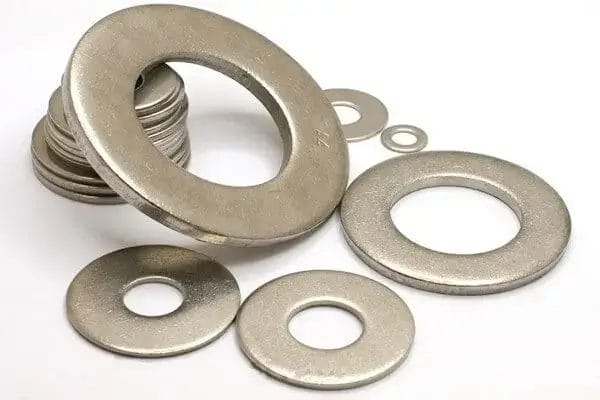
Plain washers, also called as flat washers, are simple disk-shaped parts with a hole in the middle. They usually have a flat, round shape without teeth or ridges. However, some particular versions may have knurling or slight texturing on one side for extra grip. Plain washers spread load uniformly over a larger area which prevents damage to joined materials.
In industry, plain washers are broadly used in machinery assembly, automotive and construction. They are important to avoid loosening and keeping proper bolt tension in environments with high vibration.
Torque Washer
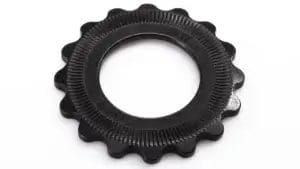
Torque washers have a particular design with radial teeth on one side and wedge-shaped cams on the other. They are also known as wedge lock washers. This shape makes a self-locking system under tension. When tightened, the cams flatten and the teeth grip the holding surfaces.
Torque washers are preferred in high-vibration settings. It also prevents bolt loosening in important operations. Industries like automotive, heavy machinery and aerospace use torque washers to keep the joint integrity. These washers can handle 12 times more vibration than standard lock washers.
Flat Washer
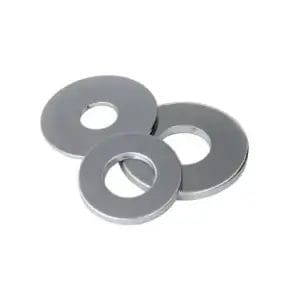
Flat washers are thin, disk-shaped parts with a central hole. These washers have different sizes and materials usually with an outer diameter 2-3 times the bolt diameter. Flat washers also compensate for small surface irregularities, provide spacing and decrease vibrations.
This type is important for keeping proper bolt tension in machinery assembly, automotive and construction industries.
Fender Washer
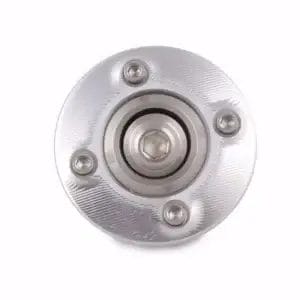
Fender washers are a type of flat washers. They have a large outer diameter relative to their inner hole size. Fender washers usually have a thickness-to-diameter ratio of 1:10 which provides better load distribution. Fender washers are preferred in operations that involve brittle or soft materials like wood or fiberglass.
They are also used in electrical, automotive, and construction industries. These washers can cover gaps 3 times wider than standard washers. It makes them appropriate for slotted or oversized holes.
Finishing or Countersunk Washer
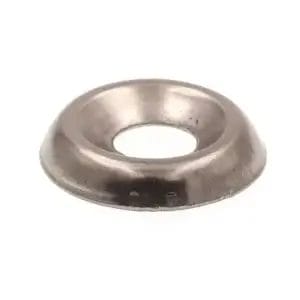
Finishing or countersunk washers have a tapered outer edge that matches with countersunk screw heads. This design produces a flush surface, which decreases protrusions and improves appearance. Countersunk washers usually have an 82-degree angle to align with standard countersunk screws.
They are important in precision engineering, woodworking and furniture making. They can increase pull-through strength by 30% over standard flat washers types in some operations.
Shoulder Washer
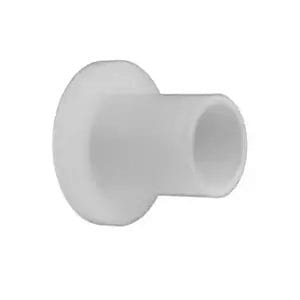
Shoulder washers have a cylindrical “shoulder” or protrusion extending from one side. They are also known as insulating bushings. This distinctive design provides mechanical spacing and electrical insulation. The shoulder length ranges from 1/16′′ to 1′′ which facilitates precise spacing control.
Shoulder washers are mostly used in automotive, aerospace and electronics industries. They avoid metal-to-metal contact which decreases the risk of short circuits. These washers can usually withstand 1500V and temperatures ranging from -40°C to 105°C. It makes them perfect for demanding applications.
C-washer
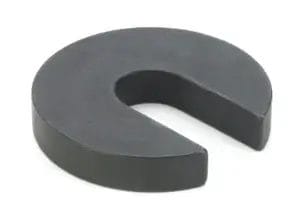
C-washers are also known as open washers. They have a C-shaped design with a gap in their circumference. This structure facilitates easy installation and removal without fully disassembling fastened parts. C-washers are usually preferred in operations where access is restricted or frequent maintenance is needed.
They are mostly used in industrial machinery, aerospace and automotive industries. C-washers usually have a thickness-to-diameter ratio of 1:8.
Spring Washers
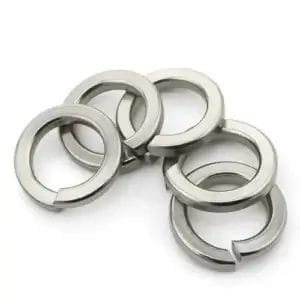
Spring washers are designed to make tension and absorb shock in fastening systems. They are also called disc springs. These washers have a wave-like or cone-shaped form that flattens under load which provides axial force. Spring washers are important in operations subject to thermal expansion or vibration.
They are usually used in heavy machinery, automotive and aerospace industries. Spring washers can keep bolt tension 30% longer as compared to flat washers types in dynamic loading situations.
Belleville or Cone-shaped Washers
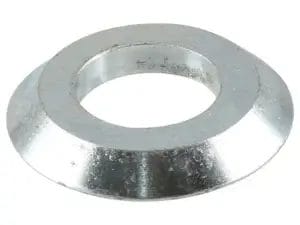
Belleville or cone-shaped washers are disc-shaped springs with a slight cone shape. These washers also provide high load capacity in a small axial space. Their particular design can facilitate deflection characteristics and exact load control. For manufacturing these washers to precise specifications, working with reliable CNC machining parts suppliers ensures they meet stringent load and deflection requirements.
Belleville washers are preferred in operations that need thermal expansion compensation, spring loading and loading signs.
They are broadly used in heavy machinery, engine mounts, brake system suspensions and foundation bolts. One Belleville washer can replace up to 5 coil springs while keeping the same force. These washers can handle temperatures ranging from -200°F to 800°F and loads up to 300,000 psi.
Dome Spring Washers
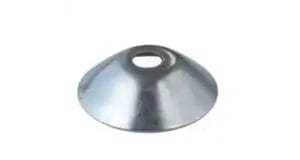
Dome spring washers are a type of spring washer that usually has a domed or curved form. These washers are usually made from very elastic materials like beryllium copper or spring steel to give outstanding performance. These washers are mostly preferred in operations that need shock absorption and accurate preload control.
Dome spring washers are also used in industrial machinery, aerospace and automotive industries. They can keep bolt tension 25% longer than flat washers under different loads. The domed shape provides a spring rate that is usually 2 to 3 times higher than flat washers.
Size Chart for Different Washers
Washer size charts are different for standards like USS, SAE, ASME and Metric size unit. These washer types charts provide important dimensions for different washer types.
Table 1: Size Chart for Flat Washers across Different Standards (SAE, Metric, and USS)
| Standard | Size | Thickness | Inside Diameter | Outside Diameter |
| SAE | #4 | 0.032″ | 0.125″ | 0.312″ |
| SAE | #6 | 0.032″ | 0.156″ | 0.375″ |
| SAE | #8 | 0.032″ | 0.188″ | 0.438″ |
| SAE | #10 | 0.032″ | 0.219″ | 0.500″ |
| SAE | 1/4″ | 0.063″ | 0.281″ | 0.625″ |
| SAE | 5/16″ | 0.063″ | 0.344″ | 0.750″ |
| SAE | 3/8″ | 0.063″ | 0.406″ | 0.875″ |
| SAE | 7/16″ | 0.063″ | 0.469″ | 1.000″ |
| SAE | 1/2″ | 0.095″ | 0.531″ | 1.125″ |
| Metric | M3 | 0.5mm | 3.2mm | 7mm |
| Metric | M4 | 0.8mm | 4.3mm | 9mm |
| Metric | M5 | 1mm | 5.3mm | 10mm |
| Metric | M6 | 1.6mm | 6.4mm | 12mm |
| Metric | M8 | 1.6mm | 8.4mm | 16mm |
| Metric | M10 | 2mm | 10.5mm | 20mm |
| Metric | M12 | 2.5mm | 13mm | 24mm |
| Metric | M16 | 3mm | 17mm | 30mm |
| Metric | M20 | 3mm | 21mm | 37mm |
| USS | 1/4″ | 0.065″ | 0.313″ | 0.734″ |
| USS | 5/16″ | 0.083″ | 0.375″ | 0.875″ |
| USS | 3/8″ | 0.083″ | 0.438″ | 1.000″ |
| USS | 7/16″ | 0.095″ | 0.500″ | 1.125″ |
| USS | 1/2″ | 0.109″ | 0.562″ | 1.375″ |
| USS | 5/8″ | 0.134″ | 0.688″ | 1.750″ |
| USS | 3/4″ | 0.148″ | 0.813″ | 2.000″ |
Materials for Washers
Washers are produced from different materials. Each material has particular properties. Let’s discuss some common washer materials.
Rubber and Nylon Washers
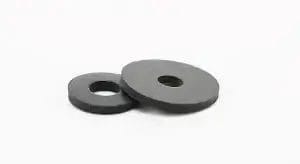
Rubber and nylon washers are usually preferred in operations that need electrical insulation and vibration dampening. Rubber washers are very flexible and can handle temperatures up to 250°F. Nylon washers have high tensile strength (12,000 psi) and resist chemicals. Both materials are corrosion-resistant and lightweight.
Metal Washers
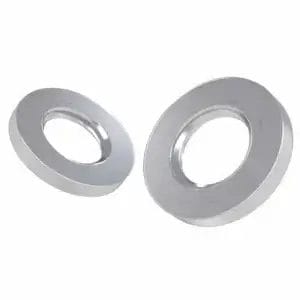
Metal washers are used in industrial applications due to their durability and strength. Common metals used in washers are brass, aluminium, and stainless steel. These washers are capable of resisting high temperatures and distributing loads. Stainless steel washers resist corrosion, while brass washers are appropriate for electrical uses. Aluminium washers with their lightweight properties also provide an outstanding strength-to-weight ratio.
Plastic Washers
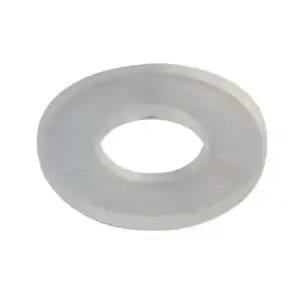
Plastic washers have particular advantages in different applications. These lightweight parts provide better chemical resistance and electrical insulation. Common materials are polyethylene, PTFE and nylon. Plastic washers are preferred in low-load situations for noise cancellation. They are mostly used in plumbing electronics and automotive parts where metal washers could cause corrosion.
Washer Standards You Should Know
Washer standards guarantee reliability and consistency in different areas. These standards define specifications for different washer types for bolts and materials. We will discuss some important standards.
ASME B18.21.1 Spring-Lock Washer
It defines the standard for helical spring-lock washers which are an important type of washer for nuts and bolts. These washers avoid loosening in high-vibration conditions.
Some important specifications include:
- Finish: Plain, zinc, or cadmium plating
- Size range: #0 to 4 inches
- Material: Carbon or alloy steel
- Hardness: Rockwell C39-50
ASME ANSI B18.22.1 Plain Washers
ASME ANSI B18.22.1 describes the standard for plain washers. They are an important part in different bolts nuts and washer assemblies. This specification guarantees reliability and consistency among industries. Some important guidelines are:
- Inside diameter: +0.010/-0.000 inches
- Thickness tolerances: ±0.004 inches for sizes up to 3/4 inch
- Materials: Carbon steel, stainless steel, brass
- Outside diameter: ±0.010 inches for sizes up to 1 inch
DIN 125A Flat Washers
DIN 125A is a German standard for flat washers. It is broadly used in European engineering. These washers are important parts in bolts, nuts and washer assemblies in different industries. Some main specifications are:
- Inside diameter tolerance: +0.3mm to +0.5mm
- Thickness tolerance: ±0.1mm for sizes up to M20
- Hardness: 140-200 HV
- Material: Stainless steel (A2 or A4)
DIN 6799 Retaining Washers
DIN 6799 sets the standard for retaining washers, an important component in securing assemblies. These washers are part of the many washer types used in various industrial apps. Some important specifications include:
- Thickness: 0.5mm to 2.5mm
- Finish: Phosphate or zinc-plated
- Internal diameter: 3mm to 72mm
- Material: Spring steel
Considerations For the Right Washers
Selecting the right washer needs careful determination of different factors. This guarantees better longevity, safety and performance in different operations.
Type of Material
The washer material has an impact on its durability and performance. Stainless steel washers provide strength and corrosion resistance which makes them appropriate for marine conditions. Nylon washers are lightweight, provide electrical insulation and are appropriate for electronics. Brass washers are preferred for plumbing operations because they can resist dezincification. Carefully select materials that will cover your particular needs.
Match Washer and Bolt Strength
Choosing washer types for bolts that properly pair with bolt strength is important for outstanding joint performance. For example, a grade 8 bolt with (150,000 psi tensile strength) needs a hardened washer with (100,000 psi+) to avoid deformation. This alignment guarantees joint integrity and load distribution under high stress.
Environmental Concerns
Select washers that are made by using sustainable manufacturing processes to decrease carbon impact on environment. Stainless steel washers provide durability, recyclability and decrease waste. Zinc-plated washers usually resist corrosion but can leach harmful materials. Consider environmental regulations like RoHS (Restriction of Hazardous Substances) options to decrease environmental hazards.
Yijin Hardware for Your Custom Fasteners
Yijin Hardware is a leading provider of custom washers for all industries. Our broad range includes torque, fender, plain and particular washers. We also provide precision engineered solutions that meet SAE, DIN standards and ASME which guarantees compatibility with global regulations.
Contact Yijin Hardware for skilled professional’s advice on your custom washer needs. Our team with more than 20+ years of experience will help you in size optimization, material selection and performance characteristics to cover your particular needs.








